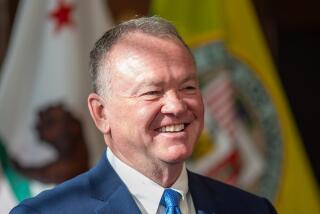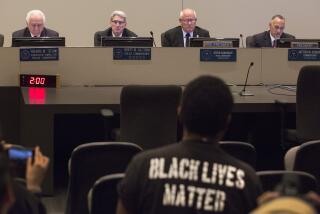New Police Commissioner Promises More Field Officers
Retired Assistant Police Chief Jesse A. Brewer, who strongly criticized the department’s upper management while testifying before the Christopher Commission, was unanimously confirmed by the City Council on Wednesday to serve on the Police Commission.
The newest member of the civilian panel, which oversees the force, said in an interview that he will call for an audit of the Police Department aimed at putting “the maximum number of people possible in the field.”
“I don’t care how long they’ve been there,” said Brewer, 69, the highest-ranking black official in department history. “We are going to have to talk about putting more people in uniforms and in black-and-whites.”
Removing officers from behind desks, Brewer said, would help the 8,300-member department enact a Christopher Commission recommendation urging that a greater emphasis be placed on “community oriented” policing, which stresses preventive programs.
He acknowledged, however, that such an approach would be a monumental problem to implement without drawing on dwindling city funds.
During his Christopher Commission testimony, Brewer said the essence of the department’s excessive-force problems can be traced to inattentive management.
He also revealed that in 1984, while in charge of dismantling the Public Disorder Intelligence Division, he saw dossiers on elected officials. For years, the controversial division had been accused of spying on public officials and police critics.
Under questioning by City Councilman Zev Yaroslavsky on Wednesday, Brewer said one file included “a photograph with some writing underneath it. . . . That was the only time I ever observed a photograph of any elected officials or anything else.”
Brewer was not asked to identify the official in the photograph, nor did he volunteer the information. In an interview after his confirmation, Brewer would only say that he ordered the file destroyed.
Also critical of department leaders during his Christopher Commission testimony was Assistant Chief David A. Dotson, whom Police Chief Daryl F. Gates later reassigned. Calling the move retaliatory, the Police Commission overruled the chief.
Brewer, who was appointed by his longtime friend Mayor Tom Bradley, vowed to protect officers who criticize Gates or the department.
“One of the things I will be doing,” Brewer said, “is ensuring that there will not be retaliation against people who wish to speak.”
Such pronouncements were welcomed by, among others, Councilmen Michael Woo and Mark Ridley-Thomas, who criticized Gates’ treatment of Dotson.
“As a member of the Police Commission,” Woo told Brewer, “you are going to be in an important position to . . . send a message to officers from the chief level to rank-and-file level about not being afraid to speak out.”
Brewer, who joined the department in 1952, will replace longtime Police Commissioner Sam Williams, who along with Commissioner Melanie Lomax resigned after the Christopher Commission recommended that panel members who tried to place Gates on leave should quit “in the interests of harmony and healing.”
More to Read
Sign up for Essential California
The most important California stories and recommendations in your inbox every morning.
You may occasionally receive promotional content from the Los Angeles Times.











